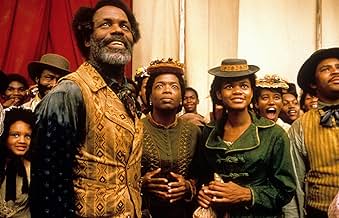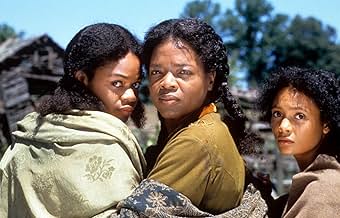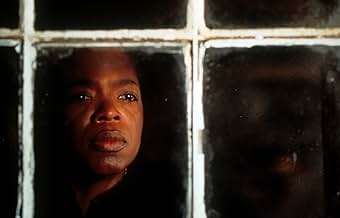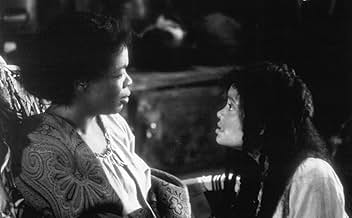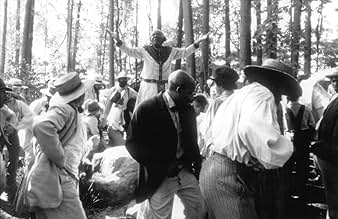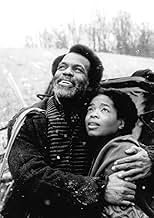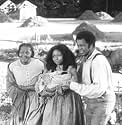PUNTUACIÓN EN IMDb
6,1/10
9,9 mil
TU PUNTUACIÓN
Basada en el libro de Toni Morrison, en el que una esclava es visitada por el misterioso espíritu de una joven.Basada en el libro de Toni Morrison, en el que una esclava es visitada por el misterioso espíritu de una joven.Basada en el libro de Toni Morrison, en el que una esclava es visitada por el misterioso espíritu de una joven.
- Dirección
- Guión
- Reparto principal
- Nominado para 1 premio Óscar
- 3 premios y 24 nominaciones en total
Kessia Embry
- Amy Denver
- (as Kessia Kordelle)
LisaGay Hamilton
- Younger Sethe
- (as Lisa Gay Hamilton)
Thandiwe Newton
- Beloved
- (as Thandie Newton)
Reseñas destacadas
Beloved the movie seeks to rival Beloved the novel in telling the African-American story. While it could not attempt to capture all of the richness of Morrison's great novel, it does do what it can in the constraints of a feature movie. The performances are phenomenal, and any Oscar nominations will be well deserved. The Ohio/Kentucky background takes one's breath away and the movie really does grip its viewer during key scenes
However, Morrison's non-linear style did not translate as well on the big screen and the flashbacks are truly confusing at points. Moreover, the movie has about three natural climaxes which heighten the viewer's awareness of the length of the movie.
All told, it is a good movie, but it is not a must-see movie, nor will it have the cultural impact Oprah intended.
(As for no likeable white characters which some posts have charged, first Mr. Baldwin is a likeable white person. Second, in a post-slavery society of Ohio/Kentucky, why do there have to be any good whites in this narrow world? Oh yeah, don't be mad at Oprah for that--Morrison didn't include any in her book either)
However, Morrison's non-linear style did not translate as well on the big screen and the flashbacks are truly confusing at points. Moreover, the movie has about three natural climaxes which heighten the viewer's awareness of the length of the movie.
All told, it is a good movie, but it is not a must-see movie, nor will it have the cultural impact Oprah intended.
(As for no likeable white characters which some posts have charged, first Mr. Baldwin is a likeable white person. Second, in a post-slavery society of Ohio/Kentucky, why do there have to be any good whites in this narrow world? Oh yeah, don't be mad at Oprah for that--Morrison didn't include any in her book either)
Even though 'Beloved' got mixed reviews, I thought it was wonderful. All the performances were amazing and Jonathan Demme did a wonderful job. I think the best performances were from Oprah and Kimberly Elise. Beah Richards was exceptionally good in her small role as Baby Suggs. I have studied slavery in the past, and I knew it was very brutal. But if you pair this move with 'Amistad' you get the real picture of slavery and how horrible it was. Another good performance came from Lisa Gay Hamilton as younger Sethe, because she exemplified the true spirit of the hopeful slave. I would not recommend to those who have a faint heart or who get squeamish easily.
Is the only word that I can describe how I felt--directly after viewing the film and for several days afterwards. I was disturbed by the comments from people who don't have any feeling for what the film is saying or from people who don't grasp what is the result from slavery, guilt, survival and how to go one. Those who say the film is too long --that is how slavery was it went on for too long, and still goes on. Comments about the quality of the film the flow of the film. People seldom think in chronological order--feelings, taste, smells return in bursts . I have not experienced slavery(although I am African American) but only the results of slavery - mentally, emotionally, physically, socially, and economically--The film starts out with the reunion of Sethe and Paul D-(who both did time(as in prison) on Sweet Home)--the haunting of the home that Sethe occupies with her daughter Denver--this is similar to haunting women experience when they have had an abortion --you never get over it and even though I understood Sethe's need to destroy her children rather than have them experience slavery I just could not do it--I would rather inflict something on myself to prevent the ability to have any more children. But it is the same people that with courage and hope that is responsible for my life today. People(those with the negative comments) should stick to movies such as Austin Powers--they are uncomfortable with movies that invoke any thought, or feeling.
I found it difficult to understand the movie, and some of the dialogue, but it mattered little. I wish I'd read the book--perhaps I will, but I don't think so. A film must stand by itself, or it is not a film.
"Beloved" has long passages of greatness. First, it contains one of the best and most fascinating performances I've seen in years, given by Thandie Newton. She spent most of "Gridlock'd" in a coma, unfortunately, and that's the most notable role she's had until this one. Her first speaking (if you'll call it that) line is gripping, frightening, and amusing, and she plays a mental defective in a manner which I've never seen before. She has the loudest, rudest character, and many actresses would be put off by some of the things she must do throughout the film. However, our attention is also held by her quiet moments, as well as a few shots where the camera is content to gaze tranquilly into her beautiful eyes.
That camera is conducted with the supreme artistry of one of my favorite photographers, Tak Fujimoto, who was with director Jonathan Demme since the late '70s. Fujimoto is in love with earth and flesh tones here, but he also shoots his actors' eyes as if they were a part of the human body we'd never really noticed before, and wanted to give them the attention they deserved. It's a great approach to cinematography that pays off an infinite number of times, from the first major shot, of Sethe and Paul D reuniting (as Winfrey and Glover look at each other, they look not just into the camera, but directly into OUR eyes), to the last major shot, Jason Robards (God love him) staring in horror at a most unusual scene in front of Sethe's home.
This film is no "The Color Purple", with Welles-influenced camera angles and sacchirine-induced uplift. "Beloved" is a long, difficult, often off-putting film which doesn't really provide the big payoff at the end. This isn't necessarily good, but it isn't necessarily bad, either. Highlighted sequences include two truly remarkable sermons in the woods by Baby Suggs (Beah Richards--Oscar-nominated in '68 for "Guess Who's Coming to Dinner?"), a horrifying opening which features the most gruesome use of animatronics to date, and the notorious flashback which explain what has haunted Sethe all these years, and who Beloved really is.
I compare this film with "The Thin Red Line". Both come from notable directors, are based on famous novels, used huge budgets, and were very long. Both films disappointed many, many people. Most importantly, however, they both had parts which were greater than the whole, occasional strokes of genius, and were made by men who took the art of filmmaking seriously.
"Beloved" has long passages of greatness. First, it contains one of the best and most fascinating performances I've seen in years, given by Thandie Newton. She spent most of "Gridlock'd" in a coma, unfortunately, and that's the most notable role she's had until this one. Her first speaking (if you'll call it that) line is gripping, frightening, and amusing, and she plays a mental defective in a manner which I've never seen before. She has the loudest, rudest character, and many actresses would be put off by some of the things she must do throughout the film. However, our attention is also held by her quiet moments, as well as a few shots where the camera is content to gaze tranquilly into her beautiful eyes.
That camera is conducted with the supreme artistry of one of my favorite photographers, Tak Fujimoto, who was with director Jonathan Demme since the late '70s. Fujimoto is in love with earth and flesh tones here, but he also shoots his actors' eyes as if they were a part of the human body we'd never really noticed before, and wanted to give them the attention they deserved. It's a great approach to cinematography that pays off an infinite number of times, from the first major shot, of Sethe and Paul D reuniting (as Winfrey and Glover look at each other, they look not just into the camera, but directly into OUR eyes), to the last major shot, Jason Robards (God love him) staring in horror at a most unusual scene in front of Sethe's home.
This film is no "The Color Purple", with Welles-influenced camera angles and sacchirine-induced uplift. "Beloved" is a long, difficult, often off-putting film which doesn't really provide the big payoff at the end. This isn't necessarily good, but it isn't necessarily bad, either. Highlighted sequences include two truly remarkable sermons in the woods by Baby Suggs (Beah Richards--Oscar-nominated in '68 for "Guess Who's Coming to Dinner?"), a horrifying opening which features the most gruesome use of animatronics to date, and the notorious flashback which explain what has haunted Sethe all these years, and who Beloved really is.
I compare this film with "The Thin Red Line". Both come from notable directors, are based on famous novels, used huge budgets, and were very long. Both films disappointed many, many people. Most importantly, however, they both had parts which were greater than the whole, occasional strokes of genius, and were made by men who took the art of filmmaking seriously.
Beloved is one of the best movies of the last decade. I have read many, many reviews which seem to have been written by those who have little to no idea of just how complex and difficult Toni Morrison's original novel can be. Of course Beloved (the movie) will be long, and of course it will be emotionally draining and even confusing - the book was! That said, I loved the novel and the film version of it, which follows the original material almost verbatim. (To try and change the story would be to tamper needlessly with a Pulitzer and Nobel Prize-winning book). I am no Oprah nut but she obviously had a deep respect and understanding for the story, which is evident in her surprisingly understated acting. Thandie Newton was simply amazing; I am glad I watched the film if for nothing else than the chance to see her performance (which, to be honest, has helped a key facet of the book make sense for me). The production design is flawless, and, as always, Jonathan Demme proves he's more than above average as a director. If you like pulp trash and want your movies dumb, loud, and shallow, avoid the movie version of Beloved. But if you're looking for a magnificently acted and gorgeously produced film, see this movie the first chance you get. I'm very glad I did.
¿Sabías que...?
- CuriosidadesThandiwe Newton's African first name means, interestingly enough, "beloved."
- PifiasIn the scene with a deer in the field, a car is visible driving by in the upper right hand corner.
- Citas
Baby Suggs: And the beat, beat, of your heart... Love it. More than the lungs that need yet to breathe free air. More than the womb, which holds life. More than the private parts that give life. Love your heart. This... this is the prize. Amen. This the prize... Amen!
- Créditos adicionalesIn lieu of traditional opening credits, the movie begins with the camera moving through a cemetery to focus on a gravestone engraved with the sole word "BELOVED".
- Versiones alternativasIn the version aired on television there is a deleted scene and two alternate scenes. The TV version also removes any mention of Sethe's sons. They don't exist in the TV version. The first alternate scene is when Paul D is telling Sethe about Halle being in the loft. In the theatrical you see Paul D quoting Halle. In the TV version there is a flashback to Halle (Hill Harper) saying "The loft." The second alternate scene in the prayer group discussing how to deal with Sethe being haunted by Beloved. In the theatrical there is a line about Sethe being like batter. In the Tv version that is removed and there is a line inserted from another woman saying "I don't mind a little communication between worlds but this is invasion" and another character says "we better get to work and pray" The deleted scene added for the TV version has Stamp Paid asking Paul D if beloved is his problem and not what Sethe did.
Selecciones populares
Inicia sesión para calificar y añadir a tu lista para recibir recomendaciones personalizadas
Detalles
Taquilla
- Presupuesto
- 80.000.000 US$ (estimación)
- Recaudación en Estados Unidos y Canadá
- 22.852.487 US$
- Fin de semana de estreno en EE. UU. y Canadá
- 8.165.551 US$
- 18 oct 1998
- Recaudación en todo el mundo
- 22.852.487 US$
- Duración2 horas 52 minutos
- Color
- Mezcla de sonido
- Relación de aspecto
- 1.85 : 1
Contribuir a esta página
Sugerir un cambio o añadir el contenido que falta



